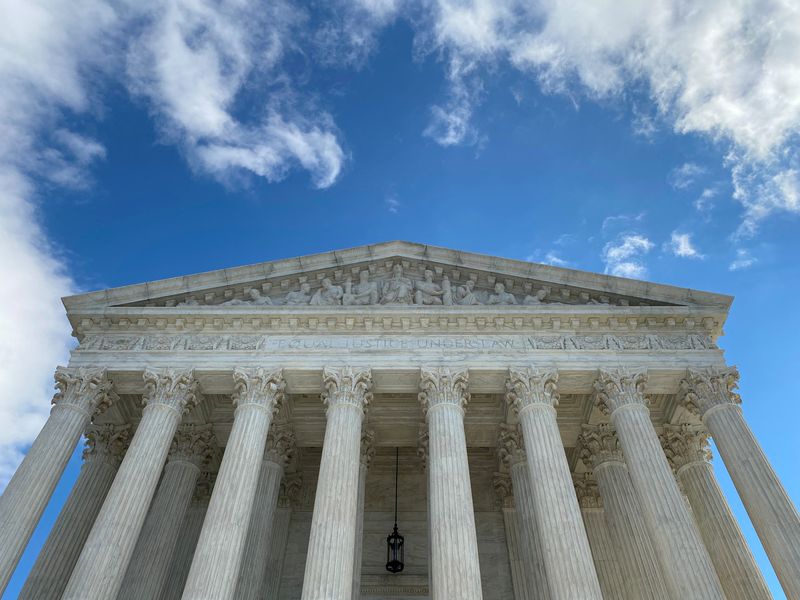By Andrew Chung
WASHINGTON (Reuters) -U.S. Supreme Court justices on Tuesday appeared ready to bolster the ability of employees to obtain accommodations at work for their religious practices in a case involving an evangelical Christian former mail carrier's claim of discrimination against the U.S. Postal Service.
The nine justices heard oral arguments in an appeal by Gerald Groff, a former mail carrier in Pennsylvania who was disciplined by the Postal Service after repeatedly failing to show up for assigned work shifts on Sundays, when he observes the Sabbath. While the justices signaled sympathy toward the issue of obtaining accommodations for religious reasons, they did not seem willing to automatically rule in Groff's favor.
Lower courts threw out Groff's lawsuit, finding that the Postal Service's refusal to exempt him from Sunday deliveries did not violate federal anti-discrimination law because it would place too much hardship on his co-workers and employer.
Some justices emphasized the "common ground" between Groff's attorneys and President Joe Biden's administration that businesses cannot deny accommodations under a federal anti-discrimination called Title VII of the Civil Rights Act of 1964 as easily as a decades-old Supreme Court precedent might suggest.
Under Title VII, which prohibits employment discrimination based on religion and other factors including race, sex and national origin, employers must make allowances for a worker's religious observance or practices unless that would cause the business "undue hardship."
The Supreme Court in a 1977 case called Trans World Airlines v. Hardison determined that to be anything imposing more than a minor, or "de minimis," cost.
Conservative Justice Neil Gorsuch said, "If we were simply to say that some courts have taken this de minimis language rather seriously and no one before us defends it ... then maybe we could do some good day's work, and put a period at the end of it, by saying that that is not the law."
Solicitor General Elizabeth Prelogar, defending the Postal Service for the administration, said she agreed in order to correct lower courts that are "led astray by that de minimis language."
Groff's attorneys had asked the Supreme Court to overturn the Hardison precedent and require companies to show a "significant difficulty or expense" before denying an accommodation.
The Supreme Court, with its 6-3 conservative majority, has a track record of expanding religious rights, often siding with Christian plaintiffs. Groff's case gives the court another chance to rule for a plaintiff claiming religious bias.
Groups representing some religions that are in the minority in the United States including Islam, Judaism and Hinduism backed Groff in the case, saying they are disproportionately denied religious accommodations, forcing them to choose between their religion and their jobs.
The dispute has also sparked debate over whether religious people are more legally deserving than others to have weekend days off from work. Unions representing postal workers have urged the justices to consider the hardship that religious accommodations have on co-workers who, for example, lose out on a day to rest or spend with family when they have to cover for shift gaps.
Liberal Justice Sonia Sotomayor emphasized the impact on other workers, noting that Groff's job required him to work as needed on Sundays.
"And he says, 'Well, now I'm not working Sunday and I'm not working religious holidays ... and it's not an undue burden to force the employer to have to give other employees greater work.'"
Conservative Justice Brett Kavanaugh noted that accommodations could burden other religious employees, including Catholics or Baptists, who would prefer Sunday off but are not compelled by religion to not work.
"It seems concerning that you're told, in effect, you don't get Sunday off even though you're religious. The other guy next to you gets Sunday off because he's religious but his religion gives him a little more benefit," Kavanaugh said.
The justices asked questions indicating that they were mulling how to provide lower courts with better guidance as to what might constitute an "undue burden" for businesses, including paying premium wages for a fill-in employee, or going shorthanded.
Groff worked as a "rural carrier associate" in Pennsylvania's Lancaster County, a job that required him to fill in as needed for absent career carriers, including on weekends.

The Postal Service in 2013, in a bid to remain profitable, contracted with Amazon.com (NASDAQ:AMZN) to deliver packages, including on Sundays.
Groff failed to report for assigned Sunday shifts. Postal officials sought to accommodate Groff by attempting to facilitate shift swaps, but were not always successful. His absences caused tension among other carriers who had to cover his shifts, the Postal Service said. Groff received several disciplinary letters and resigned in 2019.